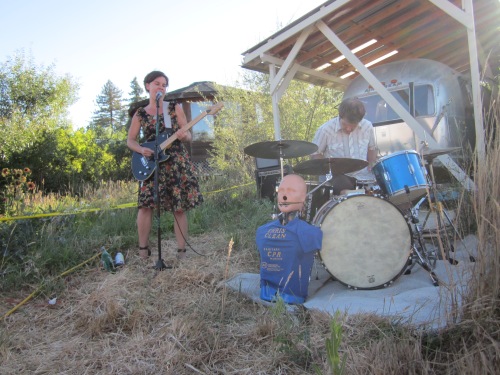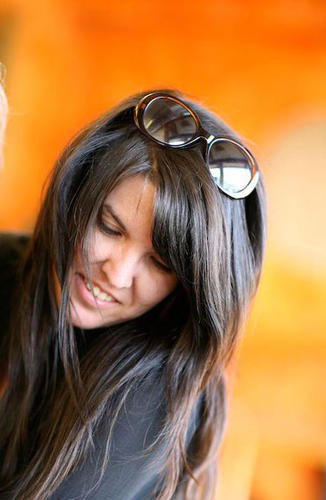Apps like Spotify and Pandora boast about ‘the social listening experience’ and tout their music-sharing features. But community has always been fundamental to how we experience music. Music allows us to forge intuitive bonds in social groups, communicating emotions, stories, and essential information. From rousing sing-a-longs held around a fire to psalms sung in church and beyond, music has always brought people together, creating and strengthening tribes, a role that continues to this day. These tribes manifest social bonds that move beyond musical notes and into the creation of social and emotional support networks.
I began playing music soon after high school. Since then, my musical tribes have taken me across the country in search of adventure, served as crucial support systems, and played a major role in making me who I am today. During that time, I’ve heard a common refrain from people: “I wish I could play (insert instrument here) but I’m too scared and/or I don’t own an instrument and I don’t have anyone to play with.”
Here's the thing: it’s way easier than you think. You can learn the skills with time, you just need to open yourself to a community that's united by the glorious sounds of notes bouncing off the walls and reverberating in the heart.
Three chords and a practice amp
[image_1_small_right]I had long wanted to play an instrument and jumped at the chance to begin learning on a borrowed acoustic guitar when I was in my teens. It didn’t take me long to fall in love with not only the act of playing an instrument, but also the joy of getting together with friends to write songs. I bought my first guitar, a simple acoustic six-string, with $80 earned at my movie theater job.
My first band was a short-lived project with my friend Del Brown. We called ourselves Queso, and we had approximately two and a half songs, all of which could be described as “amateur” at best. But we didn’t care. It was just about having fun and being part of something bigger than ourselves. I played the three or four chords that I knew out of a cheap, little Crate practice amp that I’d picked up for almost nothing, after graduating from acoustic to electric guitar.
Our humble first, and only, performance was in a San Diego backyard, opening up for a friend’s band as the sun set across glittering palm trees. But I had caught the music bug. In the twenty years since then, I’ve been in a handful of bands, toured the United States, going from New York City clubs to a Omaha church basement.
But even if you only play your basement or a neighbor’s backyard, your life can be improved, and your social bonds can be strengthened, by picking up an instrument and playing. It’s easy to leap in. Here are some ways to start:
Pick up an instrument and play!
My first (and really only) guitar lesson came from a friend with feathered hair and an obsessive love for Metallica. He taught me the opening strains to “Sanitarium,” which I practiced obsessively for months. Once I knew three chords, I was able to write songs and go from there. I also spent a couple of hours a day practicing guitar because it was just so damn fun.
I love the idea of de-skilled music playing. There is absolutely nothing wrong with being a beginner! Coming up in the nineties, some of my favorite bands included Beat Happening, Bikini Kill, Daniel Johnston, and Bratmobile. They played primitive-sounding music — no virtuoso guitar solos or bombastic drum solos required — because that didn’t matter. They just went for it, tapping a primal vein of raw musical energy.
They just picked up and starting playing, and so can you. While music lessons can be readily available for a fee via Craigslist, check first to see if you have a friend that’ll give you a few lessons for free. Have something that you’re good at? Make a trade for a few basic drum lessons or an afternoon of learning chords. You could also tap a local Timebank, where someone might be offering lessons in exchange for another service. They key thing is: It doesn’t have to cost an arm-and-a-leg to learn an instrument, and you don’t need to be able to shred Metallica solos to get up and play.
Don’t have an instrument? A borrowed one will work just as well.
Leilani Clark plays a borrowed bass and amp with her band the 50/50s
Since I started playing music twenty years ago, I’ve learned how to play guitar, bass, drum and even tambourine. I’ve bought a few instruments, including an adored black and chrome Fender Jaguar and a 1976 Fender Twin Reverb that I guard with my life. But last year, I took up drums and even played with a band for a while, without ever owning my own drum set. And now I play bass in a band, but still don’t own my own bass or amp.
Of course, if you eventually choose to get serious about playing music, make the leap and invest in your own instruments. But when you’re just starting out, see if a generous friend will lend you one of their own. Say please, treat the instrument like gold, and return it when asked, but by all means, borrow and learn before you buy.
This is how I learned how to play drums. Although drumming one of the most thrilling things I’ve ever learned to do, I just wasn’t ready to make the financial commitment to when I first started learning. These days, I don’t have a drum set gathering dust in the back room, making me feel guilty every time I look its way.
Don’t know someone with an instrument to loan? All is not lost. A local practice space may have instruments available by the hour. In Sonoma County, we have a space called the Live Musicians Co-op, that offers rooms with amps and drum sets that can be borrowed for a small hourly fee. Ask around, search online, and check the postings at music instrument stores — you’re bound to find a person or place with instruments to spare.
Find a cheap practice space or make a practice space in your house

Leilani Clark at the drums. (Photo by Whitni Radar)
Practice spaces — often converted warehouses rented to bands by the month — serve a role, but can be pricey for the casual musician. Luckily, there are almost always other options. In my community, a neighbor owns a construction workshop he rents it out for cheap to bands for night practice. As mentioned before, studios like the Live Musician’s Co-op offer space by the hour.
Have a garage or bedroom just waiting to be converted? To really save money, make a bonafide practice space in your own house with egg carton walls! Basements do a nice job of muffling the noise of loud drums and a wailing guitar. The key here is being aware and respectful of neighbors, but often if you talk to them beforehand, you can find times when your practicing won’t disturb their rest.
I’ve practiced in traditional practice spaces, but I’ve also played music in my parent’s garage and living room, in the front room of an apartment (hint: use brushes for the drumset), and in a dirt-clod, spider-web infested basement. It doesn’t matter where you practice, as long as you practice and play with others!
Set up a show.
It doesn’t have to be a club. The band Friends Forever spent years touring the U.S without touching foot in a rock club. They played hectic, wild, noise and fire-cracker laden inside of their tour van. My friend Henry’s first high school band couldn’t book a show so they took matters into their own hands and, with the blessing of the owners, played at a local Laundromat.
Looking for something mellower? How about a quiet acoustic show in your living room for a few friends, or maybe a front or backyard performance? I’ve seen bands play both sanctioned and guerrilla shows in my town’s Courthouse Square. I’ve seen performances on the train tracks, in front of an airstream trailer, on the balcony of a local arts space, and in a friend’s front yard while eating a delicious spaghetti dinner. The opportunities are endless.
Church Marching Band, a ragtag group of Santa Rosa kids, have become infamous around Sonoma County for appearing where you least expect them. They practice in a cute, little clapboard house in my neighborhood, and have been known to show up at neighborhood potlucks and in the local park for spontaneous shows. They play music for the pure joy of it, without worry or care about how they sound or what people will think. Which is what really matters: there’s a place for highly-skilled musicians who perform in fancy opera houses around the globe, but what really gets my blood pumping is a good and messy blast of live music in a surprising or unusual place.
Go to see other bands play, make friends in the music community, and support the local music scene

The 50/50s, photo by Amelia Kennedy
As I’ve gotten older, my time has become more precious, but I still try to make it out to a show at least once a week. I’m lucky that my home town of Santa Rosa has a thriving music community, with cheap shows to be had on a regular basis, but as mentioned above, it’s up to individuals to really take the reins and create a scene. Take the time to check out music you’ve never seen before! This is a fantastic way to build community, make new friends and support your town’s artistic pulse.
Here in Sonoma County, Joshua Windmiller has made a name for himself as the organizer of the North Bay Hootenanny. A tireless promoter and innovative musician in his own right with the folk/punk band The Crux, Josh embodies endless creative energy. But no one told or asked him to kickstart a local community: “When I got started, I just saw a lot of people who wanted something to happen,” he recently told me over coffee.
What began as high-energy shows in intimate venues like barns and fields have morphed into higher profile events, but Josh maintains the same dedication to providing a space for a music community to build on itself. “If you stick your neck out a little bit, it can inspire people to do something themselves,” he says.
The key is to learn to say yes to inspiration, he adds, and to cultivate a positive, anticipatory attitude. Josh puts his money where his mouth is, putting on shows on a weekly basis with the goal of providing not only a chance to see great music, but an opportunity for artists to connect with one another, allowing the community to flourish.
The other important part? “Be fluid with expectations,” he says, and become comfortable with uncertainly. Which requires that you open yourself up to new people, new spaces, and new experiences. But the payoff is immeasurable. If you have an inkling of desire to play music, open yourself up and make the leap. The connections you will make as you harness your creativity in new ways will yield enduring rewards.









